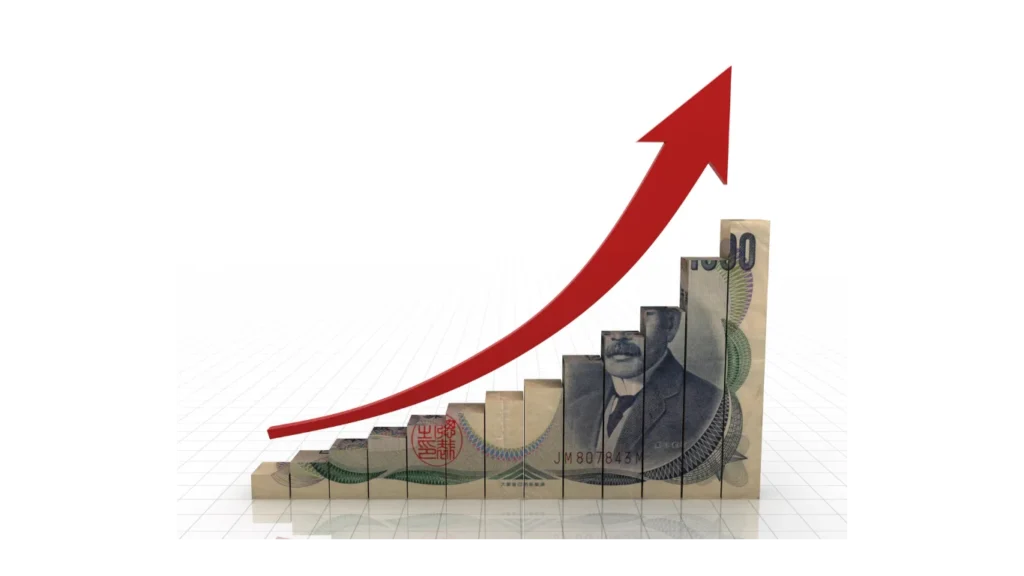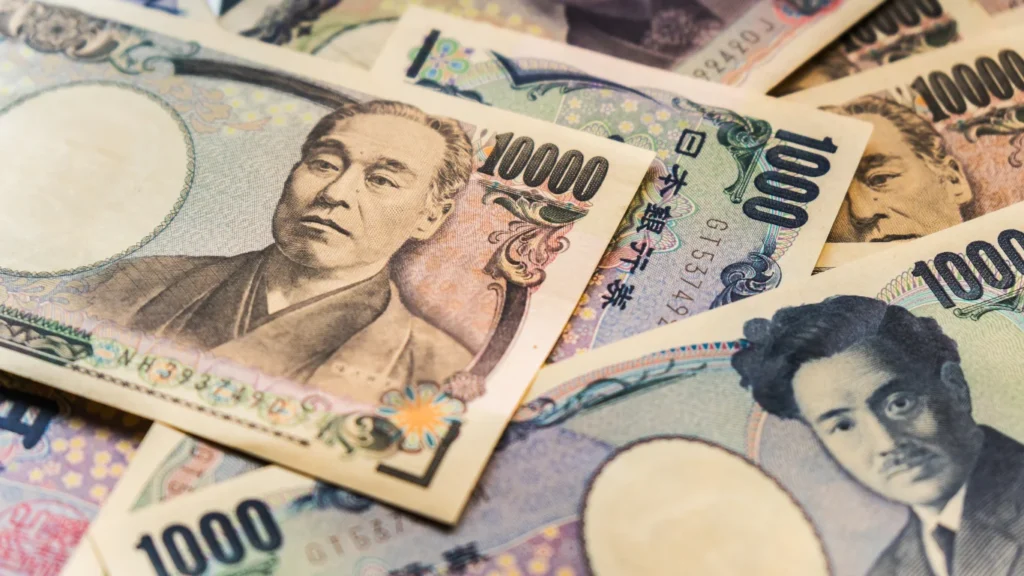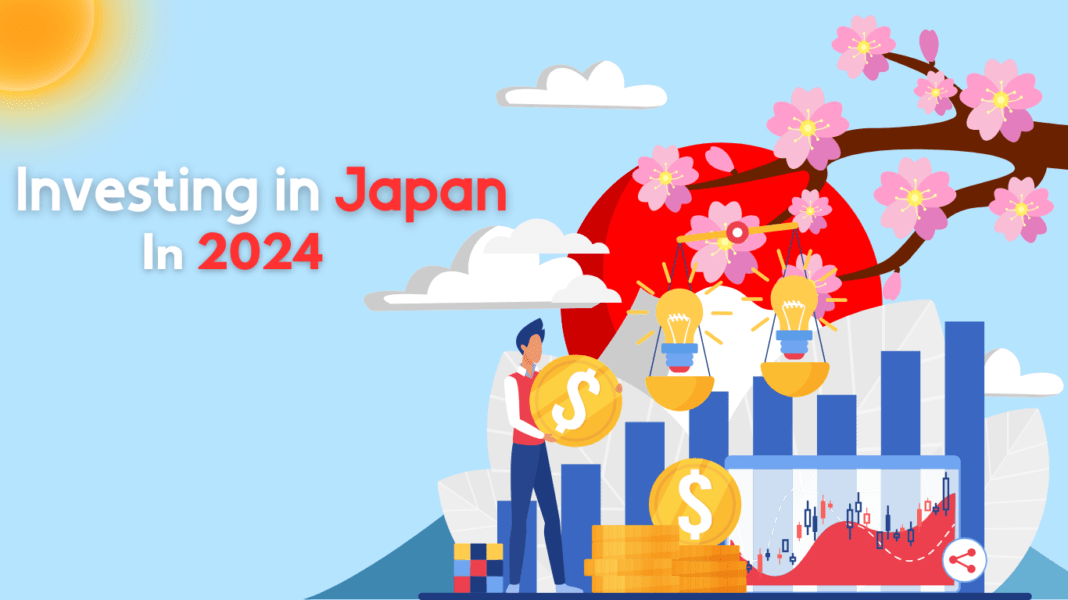Anime, technology, and beautiful culture, Japan’s contributions to the world are uncountable, even on the pocket calculator that they have created. After years of setbacks, the third-largest corporation in the world could also help improve your finances a bit. Finally, the land may experience a rising sun.
Investing in Japan in 2024 is another profitable way to make money. With different ways to profit from Japan, from Japans stock market to ETFs, we cover the basics of why you should invest in Japan today.
Japans Economic History

After World War II, Japan rebuilt itself with aid from America and innovative policies from its government. In the 1980s, Japan became known for its innovative technology, and low interest rates combined with an appetite for debt drove economic growth. Stocks tripled in value in just four years, and real estate boomed, with land prices in Japan being four times more expensive than the entire continental United States despite Japan’s smaller size.
However, this growth was not sustainable, and at the end of the decade, the bubble burst, leading to what is now known as the “lost 20 years.” The Japanese economy is still smaller than it was in 1995, and deflation has been a persistent issue, with falling prices discouraging people from making purchases and further slowing down the economy.
Fortunately, Prime Minister Shinzō Abe’s “Abenomics” program has given hope for a brighter future as Japan seeks to emerge from the shadow of China’s growing economy.
Why this is relevant to you
Geographic diversity can help in spreading your investment risk. The Japanese economy is too significant to ignore, and its recovery could make it an attractive option to invest your money. Over the past five years, Japanese stocks performed only slightly worse than American ones, but in 2018, they outstripped the US market by a significant margin.
Japan’s Economic Oddities

The one significant thing that makes Japan stand out from the rest of the world is its brains. They invent and create things that help further advance our technology every single day.
Japan is the third-largest car producer in the world, with Toyota, Honda, Mazda, Nissan, and Suzuki being some of the leading manufacturers based in the country. Japan is also home to several electronics companies, thanks to its pool of tech talent. However, with increased competition from South Korea and China, Japanese electronics companies are facing challenges. Like most developed countries, services are the mainstay of the Japanese economy, with the country hosting giants in insurance (Nippon Life), banking (Mitsubishi UFJ), and telecommunications (SoftBank).
What Makes Japan Different
Japan has two unique characteristics that set it apart from most other countries. Firstly, it has a shrinking population and lacks diversity. This is due to the fact that Japan has historically restricted contact with the outside world and has only recently opened up to immigration. As a result, less than 2% of the population are foreigners, and there are no net migrants per 1,000 population. As well as the aging population and a decline in birth rates have also contributed to the country’s diminishing population.
Secondly, Japan has an astonishingly high level of government debt, which amounts to over $10 trillion and is more than twice the size of the economy. Interestingly, the majority of this debt is owned by Japanese banks. As a result, defaulting on the debt is not an option, as it would bankrupt the banks.
Finally, Japan has a unique business culture that is based on the concept of keiretsu. This means that manufacturers, suppliers, and distributors all have stakes in each other, which has created a complex web of cross-ownership along the supply chain. This has resulted in the formation of large conglomerates such as Mitsubishi, SoftBank, and Sumitomo, which have reduced competition and innovation. As a result, new laws have been introduced to shake up corporate structures and promote competition and innovation.
How Japan’s Changing

In 2012, Prime Minister Shinzō Abe launched the “Abenomics” program to revive the economy, similar to what many Western governments had done after the 2008 financial crisis. This program involved introducing extra cash into the economy through quantitative easing, increasing government spending, and enacting new laws. Structural changes included the implementation of a corporate governance code that required companies to abandon their comfortable keiretsu. This reform aimed to improve shareholder returns, and it has been successful so far.
With all things considered, Abenomics has not been an instant success. One of the measures taken was quantitative easing, which aimed to make the yen cheaper in order to boost exports. However, this measure did not work initially. Nevertheless, the yen is now getting even cheaper due to Western banks increasing interest rates, so things might finally start to improve.
In addition, exports are expected to increase due to the Trans-Pacific Partnership and a new trade deal with the European Union, which will make Japanese exports cheaper to a billion people.
Furthermore, Japan’s restrictive immigration laws are about to become more lenient, which is expected to bring in a wave of young workers to offset the aging population and hopefully result in more economic growth.
The Risks involved
The issue of an aging population is a primary concern in Japan. As the number of elderly people increases, it leads to higher welfare bills and fewer workers. In addition, Japanese firms are seeking to acquire companies abroad due to rapid domestic growth.
Japan is also facing the impact of the US-China trade war. Many Chinese products use Japanese components, so a decline in Chinese exports affects Japan’s bottom line too. Although America is expected to sign a new trade deal with Japan, there are concerns that it could require Japan to stop devaluing the yen, which could hurt exports more than the deal helps. Moreover, the US President has threatened to impose significant tariffs on Japanese cars if he doesn’t get a favourable outcome.
Investing in Japan is a bet on Abenomics working, which is not a sure thing. A global recession could further weaken Japan’s already fragile economy. With interest rates already hovering around zero, there’s very little wiggle room to combat a slowdown. Even if the country stays afloat, it may take some time for the situation to improve.
Now, it’s time to learn how to invest in Japan.
Guide on Investing in Japan in 2024

Investing in Japanese stocks can be done quickly, in principle. Some broker accounts offer the opportunity to trade on the Tokyo Stock Exchange, allowing you to buy and sell Japanese equities just like you would in your home country. However, it’s essential to be aware that you may encounter high fees, complicated taxes, and currency conversion fees, which can be frustrating and costly.
Investing in the Japanese stock market can easily be made easy by investing in a broad market index. This can be achieved at a low cost by using ETFs. Currently, seven indices are tracked by ETFs on the Japanese stock market.
If you want to diversify your investments, ETF providers like iShares and WisdomTree can be of great help. These providers offer a bundle of stocks, which ensures that you don’t just invest in one or two companies. You can choose an index to track, whether it’s a broad index that covers all the major companies in Japan or a specialized fund that focuses on smaller firms. The primary index for Japan is the Nikkei 225, which follows the 225 largest companies listed on the Tokyo Stock Exchange.
Cheap “passive” ETFs automatically follow one of these indices. Alternatively, you can opt for more expensive, actively managed funds, where fund managers use their expertise to try to achieve higher returns. However, there’s no guarantee that these funds will perform better than passive funds.
Lastly, we have investments for those who prefer unconventional options.
Other Way to Invest
Despite Japan’s enormous debts, purchasing Japanese government bonds (JGBs) remains a trendy trade among professional investors. Although these bonds offer low returns (in fact, the coupon payment is likely to be around zero), they are considered a safe haven and typically increase in value during times of market turbulence.
Attempting to bet on a decline in the price of JGBs (also known as shorting them) has been a consistent money-loser for more than 20 years, even as Japan’s debt load has risen higher than Mount Fuji. This trade has become famous in finance circles and has been given the nickname “widowmaker,” as Japan’s debt crisis stubbornly refuses to materialize.
Many Western companies have established a strong presence in Japan, which is one of the biggest markets in the world. Therefore, if you want to gain exposure to the Japanese market, you can consider buying shares in these companies.
For instance, French automaker Renault owns 43% of Nissan, while American insurer Aflac generates twice as much profit from its Japanese division than its US branch. Similarly, Prudential Financial also has a similar story, and Japanese women with high purchasing power have a positive impact on luxury brands like Coach and Tiffany.
Related: Find other big companies from which you could buy stock.
How much should you invest in Japan?
The investment strategy you decide to adopt should depend on the other places where you have invested your money and the kind of return you are looking for. As always, we advise you to diversify your investments and focus on your primary source of income or your day job.
Therefore, it is better to invest small amounts of money in different countries rather than investing all your money in Japan. This way, if the market crashes and the values of investments in one country take a hit, your losses will be minimized as you will have a more diversified portfolio. Good luck with your future investments!
FAQ’s (Frequently Asked Questions)
Is Japan worth investing in 2024?
Investing in Japan in 2024 presents opportunities within its stable economy, particularly in leading industries like automotive, electronics, and healthcare, as well as burgeoning tech sectors. However, careful consideration of economic policies, market performance, currency dynamics, and global trends is essential to assess the potential risks and rewards.
With prudent research and a diversified approach, Japan could be a worthwhile destination for investment, but investors should remain vigilant and adaptable to market conditions.
What is the economic forecast for Japan in 2024?
The economic outlook for Japan in 2024 is positive due to several factors, including encouraging growth, nascent inflationary pressure, and ongoing market reform. Japan’s labour market is tightening, leading to wage growth for the first time in decades. This is a promising sign that higher inflation could be sustained.
What is the outlook for Japan real estate in 2024?
According to the prediction, the price level of properties in Tokyo will reach its peak in 2024 due to the limited supply of properties available. Currently, the new property market is primarily driven by wealthy owners and foreign investors. However, their interest in the market may decrease by 2024.
What is the Nikkei forecast for 2024?
The success of Nikkei 225 has led Bank of America equity strategists to increase their 2024 forecast to 41,000.






